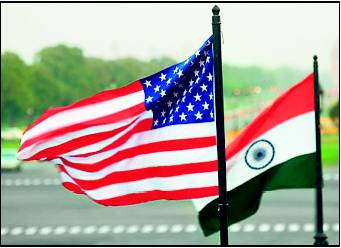US and India deepen defence and tech ties, as Biden team eyes China, Russia

The US and India are building out their partnership to share advanced defence and computing technology as the Biden administration seeks to shift New Delhi away from Russia and accelerates efforts to counter China.
Details released Tuesday of the plan, known as US-India Initiative on Critical and Emerging Technologies and initially launched in May 2022, fit into Washington’s broader agenda of strengthening military, technology and supply chain links with partner countries.
US National Security Adviser Jake Sullivan said Tuesday that the framework won’t be solely driven by the geopolitical challenge China poses, but noted that Beijing’s aggressive military moves and economic practices have had “a profound impact on the thinking in Delhi” and other capitals around the world.
“The China-Russia factors are real, but so is the idea of building a deep, democratic ecosystem of high technology,” Sullivan said Tuesday, previewing the partnership with reporters. “So, geopolitics doesn’t sit off to the side, but it’s not a comprehensive explanation for what’s at work here.”
Sullivan met his Indian counterpart, Ajit Doval, on Tuesday and both attended an event with executives from American and Indian tech firms and university presidents on Monday.
Biden is expected to travel to India for the Group of 20 leaders’ summit in September and see Prime Minister Narendra Modi in Australia at a summit of the so-called Quad security partners, which includes Japan.
One area of interest for India would be domestically producing General Electric Co jet engines, which it uses in its combat aircraft.
A proposal from General Electric is now before the US government to approve the joint-production of jet engines in the defence technology space, Sullivan said. He wouldn’t speculate on how soon an announcement might come but added the countries are aiming for “fast and ambitious progress”.
Beyond jet engines, the initiative on critical and emerging technologies also includes cooperation on artillery systems, armoured infantry vehicles and maritime security, as well as semiconductors, quantum computing and artificial intelligence.
Sullivan acknowledged that the partnership with India is not without its risks, given the weapons trade between India and Russia, but he stressed that the initiative was not sparked by the war in Ukraine or efforts to drive a wedge between New Delhi and Moscow.
“I’m not going to say that facilitating the movement of India off of Russian equipment to other equipment is an irrelevant consideration – of course it is not,” he said.
The teams are also seeking to cooperate on semiconductors, where India can play a role in diversification of supply chains. India is interested in growing its packaging and legacy chip manufacturing capabilities, Sullivan said.
Those efforts could also include efforts to build out and deploy an alternative to compete with Huawei Technologies Co Ltd on 5G telecommunications equipment. The White House is now considering a full ban on US firms selling equipment to China’s Huawei, which has already been crippled by years of US national security actions.
The impediment to India having its own chips fabrication facilities is a matter of “political and policy will,” not lack of know-how or talent, Sullivan said.
The US effort to bring advanced semiconductor manufacturing back to the America largely hinges on finding a qualified workforce.
One part of the strategy also includes a streamlining of the US’s visa system, with the White House is working with Congress to address existing issues with H1B visas and ensure the US continues to attract science and engineering talent.
- FROM SCMP, Feb 1, 2023
-
Book Shelf
-
 Book Review
DESTINY OF A DYSFUNCTIONAL NUCLEAR STATE
Book Review
DESTINY OF A DYSFUNCTIONAL NUCLEAR STATE
- Book ReviewChina FO Presser Where is the fountainhead of jihad?
- Book ReviewNews Pak Syndrome bedevils Indo-Bangla ties
- Book Review Understanding Vedic Equality….: Book Review
- Book Review Buddhism Made Easy: Book Review
- Book ReviewNews Elegant Summary Of Krishnamurti’s teachings
- Book Review Review: Perspectives: The Timeless Way of Wisdom
- Book ReviewNews Rituals too a world of Rhythm
- Book Review Marx After Marxism
- Book Review John Updike’s Terrorist – a review
-
-
Recent Top Post
-
 Commentaries
Impasse over BRI Projects in Nepal
Commentaries
Impasse over BRI Projects in Nepal
-
 CommentariesNews
Yet another Musical Chairs in Kathmandu
CommentariesNews
Yet another Musical Chairs in Kathmandu
-
 CommentariesTop Story
Spurt in Anti-India Activities in Canada
CommentariesTop Story
Spurt in Anti-India Activities in Canada
-
 NewsTop Story
Nepal: Political Stability Under Threat Again
NewsTop Story
Nepal: Political Stability Under Threat Again
-
 NewsTop Story
Accountability Tryst With 2024 Ballot….
NewsTop Story
Accountability Tryst With 2024 Ballot….
-
 NewsTop Story
What Would “Total Victory” Mean in Gaza?
NewsTop Story
What Would “Total Victory” Mean in Gaza?
-
 CommentariesTop Story
The Occupation of Territory in War
CommentariesTop Story
The Occupation of Territory in War
-
 CommentariesTop Story
Pakistan: Infighting in ruling elite intensifies following shock election result
CommentariesTop Story
Pakistan: Infighting in ruling elite intensifies following shock election result
-
 CommentariesTop Story
Proforma Polls in Pakistan Today
CommentariesTop Story
Proforma Polls in Pakistan Today
-
 CommentariesTop Story
Global South Dithering Away from BRI
CommentariesTop Story
Global South Dithering Away from BRI
-
AdSense code



















